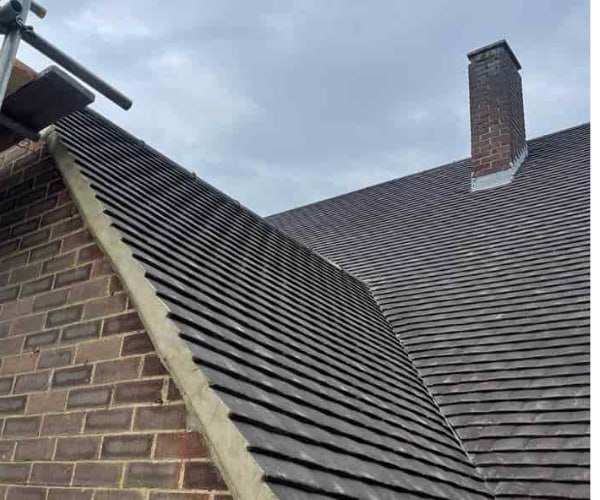Dealing With Noise From Rainfall? Your Roof Design Might Be the Cause
Introduction
The sound of rain on the roof can be relaxing — until it becomes a constant distraction or disturbance. For many homeowners in Earls Barton and across Northamptonshire, excessive roof noise during rainfall isn’t just irritating; it can impact sleep, concentration, and overall comfort. What many don’t realise is that this noise isn’t just about the rain itself — it’s often a result of the roof’s design, materials, or installation.
At SCG Roofing Earls Barton, we regularly work with clients experiencing disruptive roof noise, particularly in modern homes, extensions, and converted loft spaces. If you’re wondering why your roof seems to amplify every raindrop, read on. Your roof structure could be the culprit — and fortunately, there are solutions.
Why Does Rain Sound Louder on Some Roofs?
It comes down to more than just weather
Not all roofing systems react the same way to rainfall. The volume and tone of the noise you hear indoors is often determined by several structural and material factors.
Common contributing factors include:
- Thin or poorly insulated roof structures
- Use of metal sheets or lightweight materials
- Lack of underlay or acoustic barriers
- Steep roof pitches increasing rain impact force
- Flat roofs with minimal slope encouraging pooling and splashback
Homes with minimal insulation or converted lofts are particularly vulnerable, especially if noise-dampening materials were not included during the build.
Roof Materials That Amplify Rain Noise
Some materials are naturally noisier than others
The type of material used on your roof plays a major role in how rain sounds. Certain roofing systems, while effective in terms of weatherproofing, do little to absorb impact noise.
Materials that typically generate more noise:
- Metal roofing (steel or aluminium): Durable and long-lasting but often loud without insulation
- Flat roofing with GRP or EPDM: Excellent for waterproofing, but may create a hollow sound
- Plastic or polycarbonate roof panels: Commonly used on conservatories or outbuildings, but particularly noisy in the rain
In contrast, traditional pitched roofs with clay or concrete tiles, supported by loft insulation and a breathable membrane, tend to produce far less noise.
Poor Roof Design Can Make the Problem Worse
It’s not just what your roof is made of — it’s how it’s built
Even the best roofing materials can become noisy if the design fails to incorporate adequate insulation or structure. A thin ceiling void, limited roof pitch, or direct exposure to the roof deck can all increase sound transmission.
Problematic design features include:
- No insulation between roof and ceiling: Especially in garages, conservatories, or older loft conversions
- Flat roofs with no cavity or acoustic treatment
- Skylights without insulated reveals or double glazing
- Exposed rafters or vaulted ceilings with no sound barrier
At SCG Roofing Earls Barton, we frequently inspect properties where the noise could be dramatically reduced with minor design changes or retrofitted acoustic improvements.
How to Reduce Roof Noise From Rainfall
Practical solutions that don’t require a full roof replacement
If your roof is otherwise in good condition, you don’t necessarily need to replace it to solve the noise issue. There are several proven methods to reduce rain noise and improve overall comfort.
Effective solutions include:
- Adding insulation: Mineral wool or acoustic insulation within the roof cavity helps absorb sound
- Installing acoustic plasterboard: A simple ceiling upgrade can drastically reduce impact noise
- Applying a sound-dampening membrane: Specialist roofing membranes can be added beneath the roofing material
- Switching to noise-reducing materials: If re-roofing, consider tiles or slates that offer natural sound absorption
- Double glazing and insulated skylights: For lofts or extensions with roof windows, upgrading the glass makes a big difference
Each property is unique, which is why it’s best to have a professional roofing contractor assess the situation before making structural changes.
When to Call a Roofing Expert
Don’t let noise be a sign of something more serious
Persistent noise could also indicate deeper roofing issues. If the sound has worsened recently, or if it’s accompanied by leaks, drafts, or damp patches, it’s wise to have your roof professionally inspected.
You should seek expert help if:
- Your property has recently been extended or converted
- Noise has increased after a storm or heavy rainfall
- There are visible gaps, tears, or movement in roof materials
- The property uses a flat or low-pitch roof system
At SCG Roofing Earls Barton, we carry out thorough roof assessments to determine the exact cause of rain-related noise and recommend tailored, cost-effective solutions.
Conclusion
Rain noise doesn’t have to be a part of daily life. While some level of sound is natural, excessive noise is often a result of specific roofing choices — whether that’s the material, design, or lack of insulation. With the right professional advice and thoughtful improvements, your home can become more peaceful, comfortable, and energy-efficient.
If you’re dealing with disruptive noise during rainfall, contact SCG Roofing Earls Barton. We’re here to help property owners across Earls Barton and Northamptonshire enjoy quieter, better-performing roofs — rain or shine.
Call us on: 01604 261 699
Click here to find out more about SCG Roofing Earls Barton
Click here to complete our contact form and see how we can help with your roofing needs.

